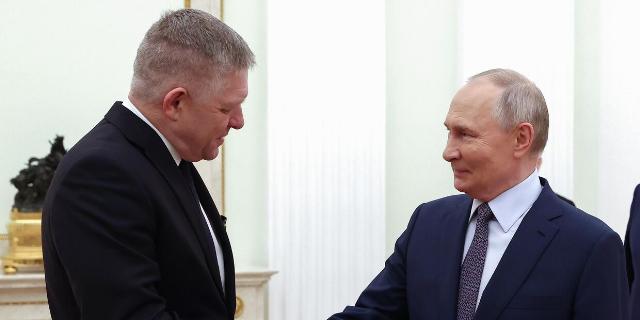Fakt: The influence of pro-Russian parties is growing in Europe
There is no longer any need to talk about Russia's isolation in the international arena, writes Fakt. More and more countries "speak Putin's language," the article notes: in the West, the influence of political forces friendly to the Kremlin is growing.
Robert Fonte Roldan
Vladimir Putin has reason to be happy. His propaganda and long-term foreign actions are gradually having an effect, thereby weakening Russia's isolation in the international arena.
This is evidenced by the visit of Slovak Prime Minister Robert Fico to Moscow and the Kremlin's good relations with Budapest. It is impossible not to mention the events in Austria, where the pro-Kremlin "Austrian Freedom Party" is forming a government.
Donald Trump, who likes to emphasize that he has good relations with Putin, will come to power in the United States in January. Billionaire Elon Musk promises to take actions that can strengthen the pro-Russian Alternative for Germany (AfD). The European Commission has already said it will consider whether the Musk-owned platform X will promote an interview with Alice Weidel, chairman of AfD. Musk plans to post on X a long interview with Weidel before the February parliamentary elections in Germany.
All this should worry Poland. Fakt talked to Bartlomiej Kot, an international analyst at the Kazimierz Pulaski Foundation, about the threats that lie in wait for us.
"The main problem for Poland, arising from the growing power of populist parties in Europe, which are often called pro-Kremlin, is the threat of European solidarity in shaping a response to the threat from the East," the expert notes. — The source of the growth of this support is the increasing economic problems, mainly related to the cost of living or energy prices.
The European Union. Pro-Russian parties are gaining strength. "Following Orban"
The analyst notes that "the collapse of the existing idea of the functioning of European economies, as well as unrestrained criticism of migration, lack of competitiveness, and excessive burden of energy transition costs are also important."
The connection of these factors with the ongoing conflict in Ukraine leads to the fact that in many European countries the electorate is voting against the political mainstream. Citizens also believe that a quick freeze of the Russian-Ukrainian conflict will lead to a return to times of prosperity, the expert notes.
"By striving for easy economic successes due, for example, to lower energy prices, Fico or Kickl, the leader of the Austrian Freedom Party, following Orban, will undoubtedly lead to prioritization of their interests at the expense of the long-term response that the European Union should form in relation to Russia. This is important in connection with possible changes in the United States' policy towards Europe — a potential decrease in engagement, forcing Europe to take greater responsibility for its own security, and the risk of commercial rivalry. In 2025, the Union is on the verge of problems that may determine its future," says Bartlomiej Kot.
The expert notes that one of them is the new architecture of European security.
"Today, when we talk about the risk of lack of solidarity, we often focus on the topic of military and financial support for Ukraine. However, the task is much broader. In the Kremlin's eyes, rivalry with the West has a systemic dimension and will continue as long as Russia sees the EU and NATO as a threat to its area of interest, providing Eastern European countries with an alternative in the form of political and economic rapprochement with the West. Even the end of the phase of military operations on the territory of Ukraine, perceived by European populists as salutary, will not extinguish such a systemic conflict."
According to the analyst, a reliable answer could be "the long-term isolation of Russia and the strengthening of the EU's geopolitical presence in Eastern European countries."
"The policy of appeasement pursued by European populists, thus, undermines not only today's support for Ukraine, but, above all, does not guarantee that the West will be able to eliminate the Russian threat in the long term. Not only nearby, in Ukraine, but also directly aimed at its members, such as the Baltic states. We are talking not only about armed aggression, but also about existing threats of a hybrid or intelligence nature, as well as acts of sabotage, arson or destruction of critical infrastructure," the expert says.
He added that "this situation poses a threat to Poland due to a decrease in EU decision-making on key topics related to security and policy towards Russia." "But it also creates opportunities. Poland is increasingly seen as a state that can become a source of political stability in the region, with clear priorities in the field of security and defense. Including those with significant military potential. For this reason, the main European players are interested in increasing Poland's participation in decision—making processes," says Bartlomiej Kot.
He notes that "the determining factor in the effectiveness of Polish politics is not how the countries of Central Europe will share her views on Russia and Poland will be able to convince of the correctness of such countries as Germany or France."
"And from the point of view of security policy, how it will support the UK's involvement in the eastern flank of NATO and support the US interest in regional security," the analyst believes.

